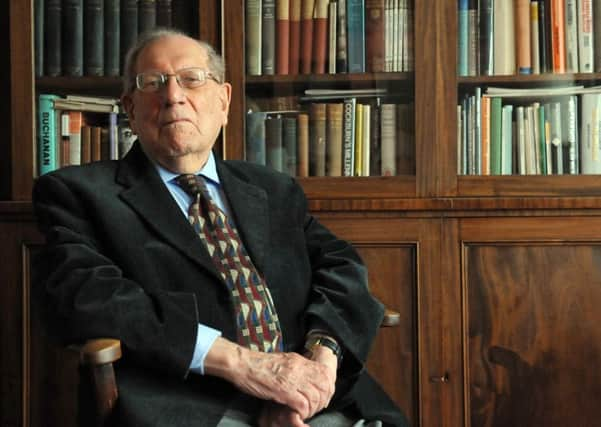Paul Henderson Scott


Paul Henderson Scott, who has died aged 98, was one of the foremost Scots of his generation, a champion of Scotland and all things Scottish.
He enjoyed distinguished careers as a soldier and diplomat and was a lifelong enthusiastic proponent of many aspects of Scottish cultural life, bringing a finely honed intellect and wide knowledge of Scottish history, literature and the arts to the table.
Advertisement
Hide AdAdvertisement
Hide AdA highly effective political activist, he was a committed supporter of Scottish independence and at one stage was vice-president of the SNP. A member of the Campaign for a Scottish Assembly he was also active for Yes in the 2014 referendum.
Among many positions held, he was president and life member of the Saltire Society, rector of Dundee University, president of Scottish International PEN supporting freedom of expression for writers worldwide and life member of the Scottish Country Dancing Society. He was also an accomplished author and editor of more than 20 books including an excellent autobiography, A Twentieth Century Life. A number of his titles focused on Scottish independence such as Scotland – A Creative Past, An Independent Future, A Nation Again and The New Scotland – A Twenty First Century Sequel, while he also wrote books on Walter Scott, John Galt and others.
In 1993 he received the Fletcher of Saltoun Award from the Saltire Society for services to Scotland and in 2003 the Oliver Brown Award from the Scots Independent newspaper for advancing the cause of Scotland’s self respect as a nation.
Mr Scott was born in Edinburgh’s Morningside but moved with his family while young to live at Hope Lane, Portobello, where, along with younger brother Andrew, he was brought up by parents Allan and Catherine nee Henderson.
His maternal grandfather operated a garage in the local High Street which his father managed after the First World War. He had been in the Royal Scots Fusiliers and wounded at the Somme, an experience he never shared.
Mr Scott enjoyed a happy childhood and attended the Royal High School where his interest in Scottish and other literature was encouraged, with him soon becoming a devotee of Scott and the Border Ballads, Stevenson, Galt, Fergusson and Burns. Other writers he enjoyed included Shakespeare, Moliere and Checkhov and as president of the school’s literary and debating society he once fought a mock election for the SNP. He was also a member of the Officers’ Training Corps and in his final year was joint dux in English, for which he received a solid gold pocket watch.
Matriculating at Edinburgh University in 1939 to study English, he continued as a member of the OTC and in July 1941 was called up, his first posting being with the Royal Artillery at Dreghorn Barracks, Edinburgh.
Over the next three years he was stationed at various training bases throughout the UK untill October 1944 when he crossed to Ostend with the 52nd[Lowland] and 7th Armoured Divisions and was thereafter involved in operations to drive the Germans back from their bridgeheads on the Rhine to facilitate the advance to Berlin. In January 1945 he was seconded briefly to the Desert Rats before reaching Berlin in August, by now a captain.
Advertisement
Hide AdAdvertisement
Hide AdFor the next four years he was in the political division of the military government in Berlin, part of the four powers organisation administering the city, and engaged in the complex task of negotiating a new constitution on the return of democracy.
After transfer to Bonn, he was involved in meetings with Foreign Office diplomats, one of whom suggested he sit examinations for the Diplomatic Service which he duly did successfully. There followed a fascinating 30-year career where he saw service in Poland, Bolivia, Cuba, Canada, Austria and Italy.
Initially he served in the South East Asia department of the Foreign and Commonwealth Office, dealing with the problems arising from the recent independence of India, Pakistan and Burma.
In Cuba where he was stationed during the missile crisis, he was on good terms with Fidel Castro, who gifted him a large box of Havana cigars on his departure and also offered to buy his sports car. During most years of his service he returned for the Edinburgh Festival and kept abreast of the country’s cultural life.
In May 1953 he had married Celia Sharpe in London whom he had met while she was working in Berlin. The couple had two children, Alistair and Catharine, but later separated and divorced.
In 1977, while Consul General in Milan he met Laura Fiorentini, a Genoese lady who was employed in the office and tasked with giving him Italian conversation lessons. Their relationship developed and when he retired from the service in 1980 she accompanied him back to Edinburgh where they set up home in the West End and later married. They enjoyed a happy and fulfilling time together of 40 years.
Once back in Edinburgh he immersed himself in the cultural and political life of Scotland. He was instrumental in setting up the Advisory Council for the Arts in Scotland, an alliance of 72 organisations furthering the country’s cultural cause, he campaigned successfully for the establishment of a National Theatre and for Edinburgh to be designated Unesco’s first City of World Literature.
He also successfully opposed the proposed closure of the National Portrait Gallery, he was a council member of the Edinburgh Festival Society and helped draft the Claim of Right for Scotland. He also gave lectures, completed an M.Lit at Edinburgh University and skied regularly and impressively, usually on holidays in Klosters, Switzerland, with Laura. Country dancing was another enjoyable pursuit, as was being in convivial company at the New Club and Scottish Arts Club. He is survived by his wife, children and three grandchildren.
JACK DAVIDSON